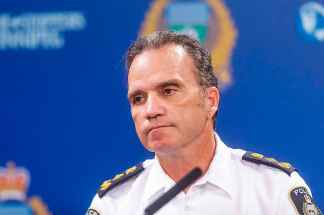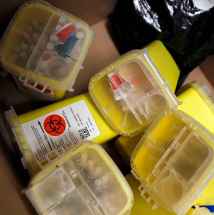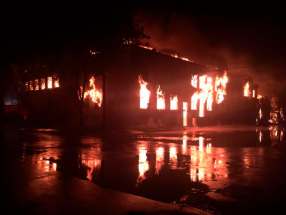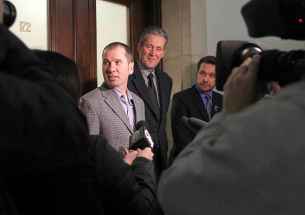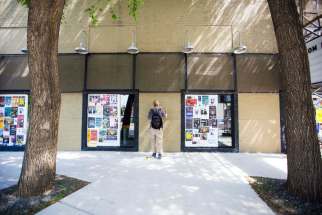ER closures could deliver unpleasant diagnosis for Tory incumbents
Read this article for free:
or
Already have an account? Log in here »
To continue reading, please subscribe:
Monthly Digital Subscription
$0 for the first 4 weeks*
- Enjoy unlimited reading on winnipegfreepress.com
- Read the E-Edition, our digital replica newspaper
- Access News Break, our award-winning app
- Play interactive puzzles
*No charge for 4 weeks then price increases to the regular rate of $19.00 plus GST every four weeks. Offer available to new and qualified returning subscribers only. Cancel any time.
Monthly Digital Subscription
$4.75/week*
- Enjoy unlimited reading on winnipegfreepress.com
- Read the E-Edition, our digital replica newspaper
- Access News Break, our award-winning app
- Play interactive puzzles
*Billed as $19 plus GST every four weeks. Cancel any time.
To continue reading, please subscribe:
Add Free Press access to your Brandon Sun subscription for only an additional
$1 for the first 4 weeks*
*Your next subscription payment will increase by $1.00 and you will be charged $16.99 plus GST for four weeks. After four weeks, your payment will increase to $23.99 plus GST every four weeks.
Read unlimited articles for free today:
or
Already have an account? Log in here »
Hey there, time traveller!
This article was published 22/07/2019 (2332 days ago), so information in it may no longer be current.
Perhaps it was by design, or just dumb luck, but on the day the Seven Oaks emergency department ceased to exist, the veteran Tory MLA who hopes to represent the riding the hospital is located in was out of the country.
Shannon Martin, the Progressive Conservative candidate in McPhillips, was attending a meeting of Midwest Legislative Conference in Chicago, an annual gathering of elected officials from Canada and United States. It sounds very much like an event that was booked well in advance of Winnipeg Regional Health Authority’s decision on the date Seven Oaks’ ER would close.
Given his attendance in Chicago, Martin could not be reached for comment. Still, all things being equal, one can imagine that he was somewhat relieved to be out of the province Monday rather than back in McPhillips, watching news conferences from hyperactive opposition critics or facing angry, awkward questions from constituents.

His absence, however, will only serve to delay the inevitable.
With a provincial election now scheduled for Sept. 10, and an official campaign expected to start in early August, Martin will still have to deal with the fallout of Seven Oaks on the campaign trail. It hardly seems fair when you consider how Martin ended up running in McPhillips.
Martin was the big loser in the game of politically motivated musical chairs that took place after new electoral boundaries were released last year. Just about every riding was affected, but the biggest change was that rural Manitoba would lose one riding and Winnipeg would gain one.
The new boundaries meant that Martin’s beloved Morris riding — a mostly rural riding smack up against Winnipeg’s southwest limits — was no more. That was a significant loss for Martin and for his party; Morris was considered solid “yellow dog” country, the term used to describe the safest Tory seats in rural Manitoba.
Running in McPhillips
Registered candidates to date in McPhillips. (NOTE: candidates become official only after the writ period has actually started — between 28 and 34 days prior to Sept. 10).
John Cacayuran (LIB)
Shannon Martin (PC)
Greg McFarlane (NDP)
Dave Wheeler (IND)
Losing a safe seat wasn’t Martin’s only worry. Other Tory incumbents moved quickly to snatch up all the neighbouring electoral districts that bordered his old turf. There was literally nowhere for him to go. At least, nowhere contiguous to his old riding.
The new McPhillips riding was available, largely because no other Tory MLA was being forced to run there. The opportunity features both positives and negatives.
On the plus side of the equation, McPhillips is a hybrid of urban and rural/bedroom voters not unlike those that populated Morris. Along with wedge carved out of the northern-most tip of the city, McPhillips takes in the entirety of the Rural Municipality of West St. Paul, which was formerly part of the St. Paul riding held by Infrastructure Minister Ron Schuler. That certainly suggests there are sympathetic Tory voters who will not punish Martin for parachuting into McPhillips.
But there are also negatives. The more diverse and densely populated urban portion of the new riding has not been kind to the Tories in past elections. And then, there is the Seven Oaks situation to deal with.
Seven Oaks is one of three hospital ERs — Victoria and Concordia were the others — to be closed and converted into urgent-care facilities. There is method behind the madness of this hospital restructuring, but it has been difficult for all involved.
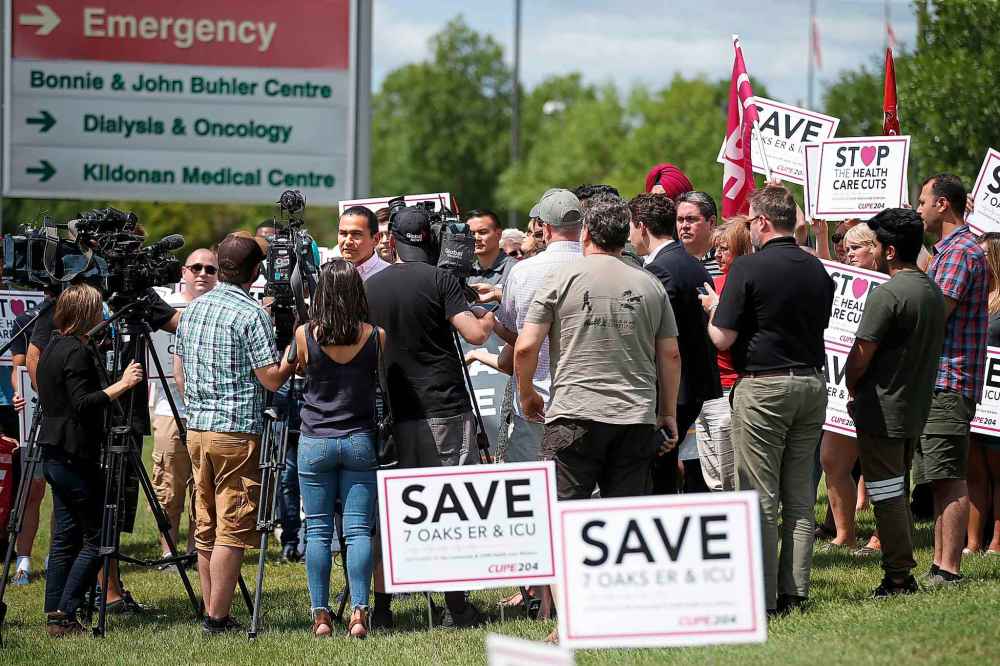
It matters very little that WRHA officials have said that more than two-thirds of all the patients presenting to Seven Oaks ER can be fully treated in the new urgent-care facility. Losing full ER status is a volatile issue that has residents angry and opposition parties licking their chops with anticipation at the potential to bring down Tory incumbents.
Add to that the fact that the remaining ERs are bursting at the seams, and you’ve got plenty of fodder for opposition parties to accuse Premier Brian Pallister and his PC party of creating a health-care crisis. It’s quite unclear that things have reached a crisis level, but the change brought by the province has certainly created the impression that fiscal concerns are trumping quality health care.
If there is any solace for Martin, it is that he will not be alone among Tory candidates struggling to avoid the blowback from the hospital reorganization.
Although ER closures could very well be a live issue all over Winnipeg, certain Tory incumbents will, like Martin, face a more direct threat. This is particularly so in north Winnipeg, where two hospitals were affected (Seven Oaks and Concordia), opposition has been more vocal and voters have a history of voting NDP: Cathy Cox (Kildonan-River East); Andrew Micklefield (Rossmere); James Teitsma (Radisson); and possibly even Blair Yakimoski (Transcona).
All of these seats were steals for the Tories in 2016, all at the expense of the NDP. Some, such as Rossmere, are genuine swing seats, having toggled back and forth between the NDP and Tories for decades. Others, such as Teitsma’s Radisson riding, which had not been represented by a Tory in more than 30 years, or Kildonan, which had been held by NDP MLA Dave Chomiak for more than a quarter-century, were total shocks.
It will all likely come down to redistribution and a poll-by-poll analysis of how residents have voted in the past. But if the ER closures turn out to be a trump card — an issue that eclipses past voting behaviour and party affiliation — then Martin and the other incumbents may find this election to be a much rougher ride than the last one.
dan.lett@freepress.mb.ca

Born and raised in and around Toronto, Dan Lett came to Winnipeg in 1986, less than a year out of journalism school with a lifelong dream to be a newspaper reporter.
Our newsroom depends on a growing audience of readers to power our journalism. If you are not a paid reader, please consider becoming a subscriber.
Our newsroom depends on its audience of readers to power our journalism. Thank you for your support.
History
Updated on Tuesday, July 23, 2019 3:17 PM CDT: Typo fixed.



